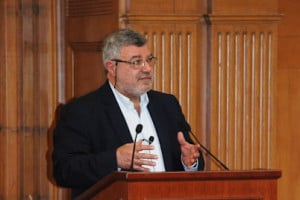Thirty-six youth activists from 17 countries, including many who helped organize parts of the Arab Spring, gathered on campus last week for the inaugural American Middle Eastern Network for Dialogue at Stanford (AMENDS) conference.
Speakers at the conference included Moulay Hicham Ben Abdallah M.A. ’97, a Moroccan prince and consulting professor at Stanford; Kavita Ramdas, former president and CEO of the Global Fund for Women and current executive director for the program on social entrepreneurship at the Stanford Center for Democracy, Development and the Rule of Law (CDDRL); and Jeremy Weinstein, former director of development and democracy on the National Security Council and a current associate professor of political science and senior fellow at the Freeman Spogli Institute.

The delegates had a full schedule last week, including attending workshops, networking sessions, talks by prominent members of the Stanford community and a screening of “A Whisper to a Roar,” a new documentary produced by Larry Diamond and Ben Moses and presented by the Moulay Hicham Foundation. They also gave presentations on their work to their fellow delegates. The presentations will also be available to the public on the Stanford University YouTube channel.
One of the delegates at the conference was Selma Maarouf, an Amnesty International member and Moroccan activist supporting the country’s pro-democracy February 20 movement.
“I wanted [to come to AMENDS] to share the story of my movement in Morocco because most people don’t know much about it compared to the other revolutions in the region,” she said.
Maarouf described the conference as eye-opening.
“The discussions were amazing and very rich,” she said. “I also liked how the talks emphasized how different countries in the region should work together and see the bright side in order to bring positive change.”
Another delegate was Abdullah Al-Fakharany from Egypt, who founded the civilian journalist news network Rassd News Network (RNN). RNN’s Arabic-language Facebook group currently has over 1.5 million subscribers.
“I wanted to be with people who did not think in the same way, so that I can understand a different point of view and remove any stereotypes I had,” Al-Fakharany said.
“I believe in the strength of youth, so it was inspiring to listen to the delegates and discuss their initiatives,” he added. “It was the amazing to put my touch into their ideas and have them respond to mine.”
Stanford alumni and students were also represented in the delegate pool.
Fadi Quran ’10, a Palestinian-American student and nonviolent youth activist for the Palestinian territories, recently arrested in the West Bank during a protest, returned to campus for the conference.
Quran’s work focuses not only on nonviolent resistance, but also on alternative energy in the region.
“I want to emphasize the necessity of alternative energy in the region and how it needs to be integrated with the cultures and how people live,” he said.
Quran said he sees the diversity of the delegates represented as one of the key strengths of the conference.
“I think right now it is very important for youth from the Middle East to establish relations with countries in the region,” he said. “This is necessary to prevent going back to the [dictatorships] that existed.”
Elliot Stoller ’13 and Khaled Alshawi ’13 founded AMENDS last year after a chance meeting.
“We met at Coupa Café in February 2011 through a mutual friend and knew right after that that we had the same interests and passions,” Alshawi said. “Our talk went from two minutes to two hours.”
“With everything happening with the Arab Spring at the time, [we talked about] the lack of Middle Eastern resources at Stanford and were inspired to do something at Stanford to connect and empower leaders,” Stoller said.
Stoller added that on the same day, he coincidentally had a meeting with Larry Diamond ’73 M.A. ’78 Ph.D. ’80, director of CDDRL, and decided to mention the ideas he had discussed with Alshawi. Diamond advised Stoller to write up a proposal.
“It just blew up after that,” Alshawi said.
A year later, the pair reflected on the process and pressure of establishing the first AMENDS conference, describing it as laborious but rewarding.
“We had to make sure we could deliver on our ideas, and we are just blown away by the quality of the delegates and the passion they have to seek change and grow their initiatives,” Stoller said.
After recruiting Stanford students to join the AMENDS team, the next step was to find delegates. The team did so by creating partnerships with nonprofits and universities to identify youth leaders. They also posted open applications, which were advertised through social networks like Facebook.
Overall, the conference received 300 applications from 20 countries for 40 available delegate positions. Eighty potential delegates were selected for Skype interviews to determine the final set.
“We wanted as diverse of a group as possible,” Stoller said. “But the most important criterion was how passionate they were, and how well they could articulate their initiatives and ideas.”
“After securing the delegates, it wasn’t too hard to get speakers who were eager to come speak to them and meet them,” Alshawi said.
Stoller and Alshawi gave credit to the AMENDS team members for their “incredible hard work and how they all stepped up to pull the conference together.” The pair said they have made plans to ensure that the conference continues to run and develop in the future, including bringing on Meredith Wheeler ’14 as a co-president. Wheeler is a member of The Daily Editorial Board.
“We stressed from the very beginning that we wanted this to be a thing that would organically develop at Stanford,” Stoller said. “We feel like we have set up the right institutions for that to happen.”